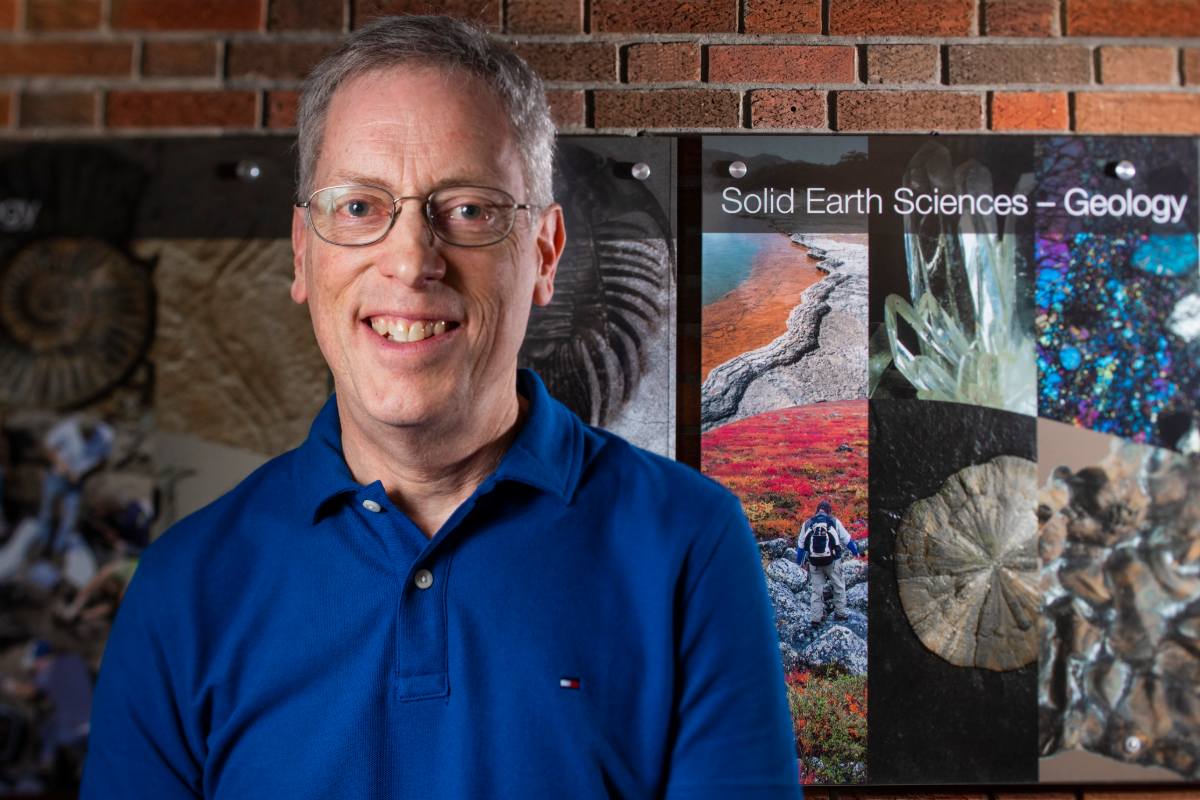
March Instructor of the Month and faculty lecturer Fred Clark shares his advice to students. Photo credit: John Ulan
A faculty lecturer in the geology program, Fred Clark has been a member of the Department of Earth and Atmospheric Sciences for more than 25 years. Having taught countless sections of 20 different courses over the years, Clark passes on some advice to students as our March instructor of the month: embrace the connections between your courses, and you can always continue to learn.
What do you teach?
I teach or have taught a wide range of geological subjects at the undergraduate level. These start with the foundational courses for both the geology and environmental earth sciences programs, Planet Earth (EAS 100) and The Dynamic Earth Through Time (EAS 105). Moving forward in those and other programs, my teaching has included geology for Engineering students (EAS 210), Mineralogy I (EAS 224), second and third year sedimentary geology and stratigraphy courses (EAS 222 and EAS 336), Petroleum Geology (EAS 364), and Invertebrate Paleontology (EAS 230).
I’ve also taught several of our general-interest courses intended mostly for non-geology students, including Earth Science I (EAS 201), Environment Earth (EAS 205), Geology of the Solar System (EAS 206), Mass Extinctions and Dinosaurs (EAS 207), and Geology of Western Canada and the National and Provincial Parks (EAS 209).
What is the coolest thing about this field?
I think the coolest thing about geology is the way things tie together, and the way that knowledge builds on other knowledge to help us make sense of the overall picture. I think the scale of geological features is amazing, as we are really dwarfed by it all—as well as by the sweep of time. Earth's plates are moving only a few centimetres per year, but let millions of years pass, and you can build mountains, submerge continents, and completely reconfigure the face of Earth while radically altering its climate.
What was your favourite learning experience? How do you incorporate that experience into teaching your students?
One of my most memorable learning experiences actually came as an instructor. There were many topics on which I barely had a grasp as an undergraduate or even graduate student, but when I had to teach them and pass them on, everything changed. I had no choice but to master them, to figure them out, so I could explain them in clear terms.
Now, my mind is constantly looking for parallels, illustrations, and alternate ways to get ideas across to students. It’s become a very creative process, and I love it when a new way of explaining something pops into my head in the middle of a lecture. Seeing lightbulbs come on for students is a great thing, and of course this happens most often when a student has dropped by my office to ask questions. The other thing about revisiting material you hadn't seen since being an undergrad is that you now have this much stronger base of knowledge and experience, so that things make more sense because you now have the larger context.
What was it that drew you to this field?
Around the time I was in Grade 5, I became very interested in dinosaurs and decided I wanted to become a paleontologist. This was a relief to my teachers, who despaired of my previous career goal, which was to drive heavy construction equipment. This interest led me to register in geology as an undergraduate. I did pursue paleontology—but not studying dinosaurs. In part because of the fact my alma mater did not have a dinosaur speciality, I ended up studying foraminifera, a group of unicellular organisms.
What do you feel is the most important piece of advice you give to your students?
I don't know that it's so much a piece of advice, as a plea to them to not keep any course in a "silo"—isolated from what they have studied before, are currently taking, or will take. I'm constantly cross-referencing their past experience, or probable future experiences, to stress the continuity of their program. I am helped in this regard by the fact that as a faculty lecturer, I have taught 20 different courses. This gives me a fair idea of what they ought to know already, what they can expect to learn, and how the current course relates to those other ones. Knowledge of a topic doesn’t end with one course—the courses are all connected to the students’ ongoing, overall education.
What would people be surprised to know about you?
I am an avid train photographer and have had one book published, chronicling the production history and variants of a group of diesel locomotives that formed the backbone of Canadian Pacific’s fleet for many years. I’ve also published several articles and a few hundred photographs have also appeared in various publications. I love jazz in particular, as well as blues music. Students who come by my office when I’m marking exams know this! The best sounds in the world are Miles Davis on muted trumpet, and John Coltrane on either tenor or soprano saxophone.